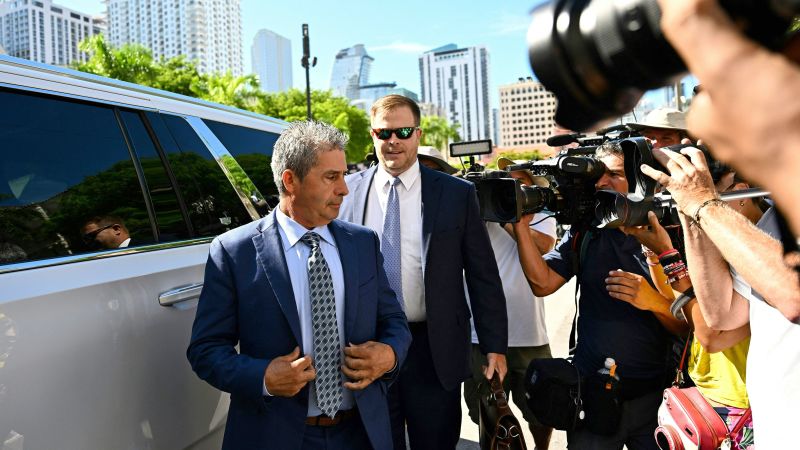Lawyers for Mar-a-Lago property manager, Carlos de Oliveira, have responded to special counsel Jack Smith’s concerns about a potential ethical conflict in their representation of their client. In a new court filing, de Oliveira’s legal team argues that there is both a lack of an actual conflict and a lack of a potential one. Prosecutors had raised the issue earlier this month, citing de Oliveira’s attorney, John Irving, who was representing three other possible witnesses in the investigation. However, de Oliveira’s lawyers state that Irving no longer represents these individuals. They also assert that Irving has not obtained any confidential information from these witnesses and that any necessary cross-examinations can be conducted by Irving’s co-counsel, Donnie Murrell.
De Oliveira’s legal team has expressed willingness for a secret hearing with US District Judge Aileen Cannon to protect their client’s constitutional rights to counsel. However, they oppose including the three witnesses in question, arguing that there is no need to parade them before the press.
This conflict issue is one of two before Judge Cannon. Prosecutors have also sought a hearing on potential ethical conflicts surrounding attorney Stanley Woodward’s representation of co-defendant Walt Nauta, as Woodward has also represented other potential trial witnesses.
All three defendants, de Oliveira, Nauta, and former President Donald Trump, have pleaded not guilty to the charges in the case.
Lawyers Argue Prosecutors Exaggerate Conflict of Interest in Mar-a-Lago Property Manager’s Classified Documents Case
In a recent high-profile case involving a former Mar-a-Lago property manager, lawyers representing the defendant have raised concerns over the prosecution’s alleged exaggeration of a conflict of interest. The case revolves around the unauthorized possession of classified documents, which has sparked a heated debate regarding the handling of sensitive information and the potential misuse of power.
The defendant, a former employee of the prestigious Mar-a-Lago resort, stands accused of unlawfully retaining classified documents related to national security. Prosecutors have argued that the defendant’s access to such sensitive information, coupled with his alleged unauthorized possession, poses a significant threat to national security. However, defense attorneys have challenged this narrative, asserting that the prosecution has exaggerated the conflict of interest in an attempt to secure a conviction.
One of the key arguments put forth by the defense is that the defendant’s role as a property manager did not grant him access to highly classified information. They contend that the defendant’s position primarily involved overseeing the day-to-day operations of the resort, and any access to sensitive documents would have been limited and strictly controlled. Therefore, the defense argues that the alleged threat to national security has been blown out of proportion by the prosecution.
Furthermore, the defense team has raised concerns about the potential bias of the prosecutors in this case. They argue that the prosecution’s focus on the defendant’s association with Mar-a-Lago, a property owned by former President Donald Trump, has created an atmosphere of prejudice. By emphasizing the defendant’s connection to a politically charged figure, the defense claims that the prosecution is attempting to exploit public sentiment and sway the jury’s opinion.
The defense also questions the timing of the charges, suggesting that they may be politically motivated. The case comes at a time when tensions between political factions are high, and the defendant’s association with Mar-a-Lago has <a href="https://dailysoundandfury.com/lawyers-argue-prosecutors-exaggerate-conflict-of-interest-in-mar-a-lago-property-managers-classified-documents-case/” title=”Lawyers argue prosecutors exaggerate conflict of interest in Mar-a-Lago property manager's classified documents case“>undoubtedly attracted significant media attention. By highlighting the defendant’s connection to a controversial figure, the defense argues that the prosecution is attempting to capitalize on public sentiment and divert attention from the actual merits of the case.
It is essential to recognize that the defense’s arguments do not dismiss the seriousness of the charges against the defendant. Unauthorized possession of classified documents is a grave offense that should be thoroughly investigated and prosecuted if warranted. However, the defense’s concerns regarding the alleged exaggeration of the conflict of interest and potential bias in this case raise important questions about the fairness and impartiality of the legal process.
In any legal proceeding, it is crucial to ensure that the accused receives a fair trial, free from any undue influence or prejudice. The defense’s arguments regarding the prosecution’s alleged exaggeration of the conflict of interest and potential bias should be carefully considered by the court. It is the responsibility of the judiciary to ensure that justice is served, and that includes safeguarding the defendant’s right to a fair trial.
As this high-profile case continues to unfold, it is imperative that the legal system remains steadfast in upholding the principles of fairness and impartiality. The allegations made by the defense regarding the prosecution’s handling of the conflict of interest and potential bias must be thoroughly examined to maintain public trust in the justice system. Only through a fair and transparent legal process can the truth be revealed and justice be served.








